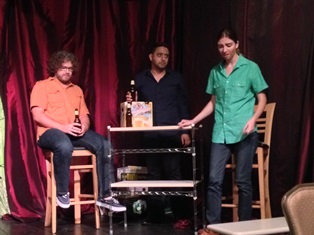New opera is alive and well in Cincinnati.

Witness NANOWorks (North American New Opera Workshop), the Cincinnati-based contemporary opera company, dedicated to the presentation of short contemporary operas by emerging North American composers.
NANOWorks closed its 2013-2014 season June 29 with a pair of new operas, each about forty minutes long. “Last Call” by Eric Knechtges was a world premiere. “At the Other Side of the Earth” by Marie Incontrera was a Midwest premiere. Both deal with gay and lesbian themes and were presented in observance of the 45th anniversary of the Stonewall Riots in New York City, which gave birth to the LGBT (lesbian/gay/bisexual/transgender) civil rights movement.
The performances took place in the Cabaret Room above the Below Zero Lounge in Over-the-Rhine and were directed by NANOWorks co-founder/general director Kendall A. NANOWorks music director AikKhai Pung conducted. (This reviewer attended the final performance on June 29.) The set consisted of a raised platform backed by a red curtain, with tables and chairs and for Knechtges’ work, a bar.
Brooklyn-based Incontrera’s “At the Other Side of the Earth,” premiered in New York City in May, is a powerful work. Subtitled “a riot girl opera,” with music and libretto by Incontrera, it tells of a young girl’s coming out in a hostile environment. Aurora – a dual role sung by sopranos Autumn West and Melissa Harvey – watches herself sitting meekly at a table while the object of her affections, the supremely confident Layla -- mezzo-soprano Esther Kang in a silver-blue Mohawk – enters. Aurora 1 and Aurora 2 (West and Harvey, respectively) recall that it took six months for her to admit she was a lesbian. “The Man,” baritone Ben Flanders, enters and challenges Layla, reminding her that homosexuality is illegal. Layla resists and gets smacked to the ground. Aurora 2 and Layla express their love nonetheless, inspiring Aurora 1 to assert herself and finally declare “I will not be silent.” Unable to act, The Man leaves.
Incontrera’s style is declamatory and highly dramatic, with significant musical challenges (West’s agile high notes as Aurora 2, for example). Kang’s “Revolution” – “I am woman . . . mess with me, I’ll break your jaw” –was riveting. Flanders conveyed just the right amount of disdain as The Man, reminding the girls of their Miranda rights – read obligation to “remain silent” -- and warning them “show us the unnatural and we’ll have you gone by night.” He also cracks jokes about women – “why don’t women need to wear watches? Because there’s a timer on the stove.”
The accompanying string quartet – violinists Nick Naegele, Dyllan Firle, violist Peter Gorak and Eric Knechtges,” cello – made suitably raspy sounds at one point to underscore The Man’s malice. Harvey and Kang’s love scene was beautifully sung, and West’s coming to life as Aurora 1 (“I will not be silent”) made a stirring impression. The two Auroras sang a final farewell to Layla, catalyst of Aurora’s new found freedom.
Composer/librettist Knechtges, head of composition at Northern Kentucky University, has constructed a more lyrical work in “Last Call,” one more beholden to traditional opera. In two scenes, it is set in 2012 in the only gay bar in a small, Midwestern city. Characters include the bar tender/owner Eugene, his customers Terry, Mike and Justin, and two employees, both drag queen entertainers, Anita Cocktail and Donna Matrix. The accompaniment comprised keyboards -- three players, Zac Mills, W. Brian Theis and Knechtges -- and violinist Naegele, led by Pung.
Multiple themes play out in the opera, a major one having to do with HIV/AIDS. Terry (baritone Joel Wolcott) takes his seat at the bar and orders a drink from Eugene (tenor Brian González). Mike and Justin (baritone Andrew Whelan and mezzo-soprano Lauren McAllister in a pants role) enter, sit at a table and surf their cell phones for dates. Anita, a septuagenarian in a long platinum wig and white satin gown, sings his usual song, “I Will Rise,” to mixed approbation. Donna Matrix (countertenor Josh Boggs), garbed in blue, sings of his frustration performing for “this wretched scene” instead of making it “in the city,” alternately lip-synching a lively tune for the customers. Eugene puts a bowl of popcorn on the bar, but prevents Justin from eating it because he is HIV-positive.
Eugene tells Mike about customers who have died of AIDS. A trio of bachelorettes (sopranos Harvey, West and Kang) enter for a celebration and get thrown out by Donna. Mike and Eugene disappear for an assignation, and Anita and Donna make return appearances. Scene two (two weeks later) sees Eugene, Terry, Justin and Donna lamenting the closing of the bar and the death of Anita of a heart attack. They close with a reprise of her “I Will Rise.”
Knechtges’ fabric consists of proto-arias, recitative and ensembles, all eminently listenable. He has interwoven bits of “Carmen” (Bizet), Richard Strauss (“Elektra”), Vitali (Chaconne) and “Go Tell Aunt Rhody” where the libretto offers a prompt, lending a touch of humor to his thoroughly serious subject. For a general audience, one would surmise that his work has more “legs” than Incontrera’s.
The enterprise and accomplishment of NANOWorks is hard to overstate. Since its founding in 2012 by Kendall A and Jennifer Jolley, the company has premiered four works and presented regional premieres of six others. Upcoming next season are a triptych by New York composer Daniel Felsenfeld, several world premieres, three open-to-the-public workshops and two unstaged concerts of works in progress. A call for scores that ended June 1 yielded over 60 submissions, said Kendall A.
For further information, visit www.nanoworksopera.com